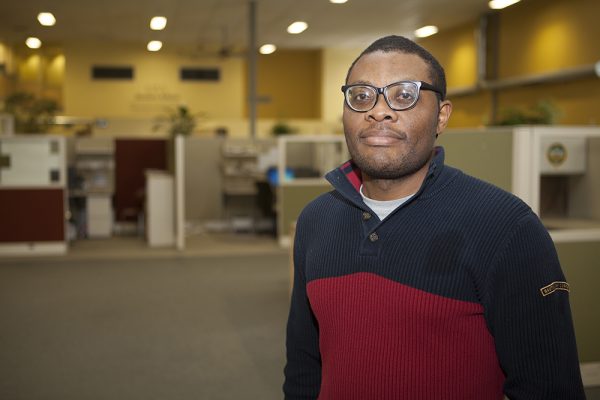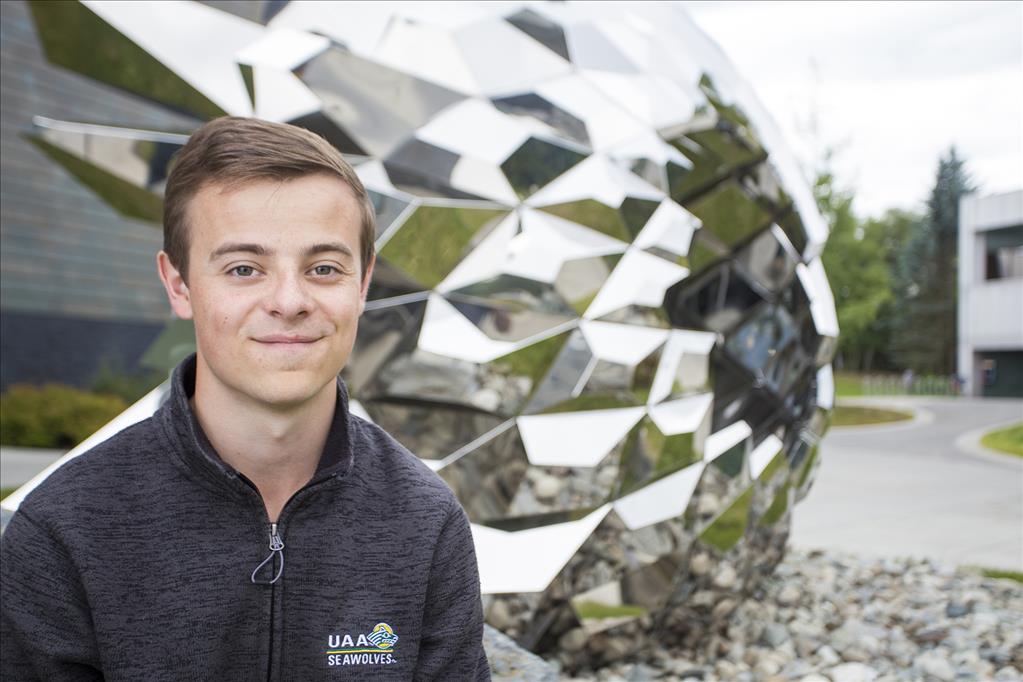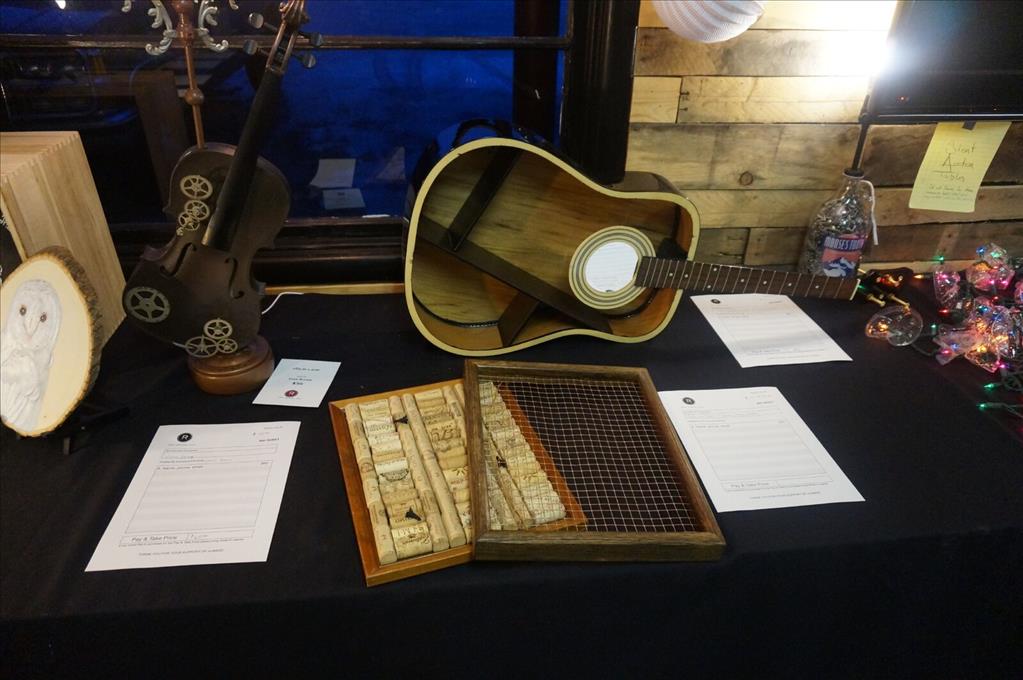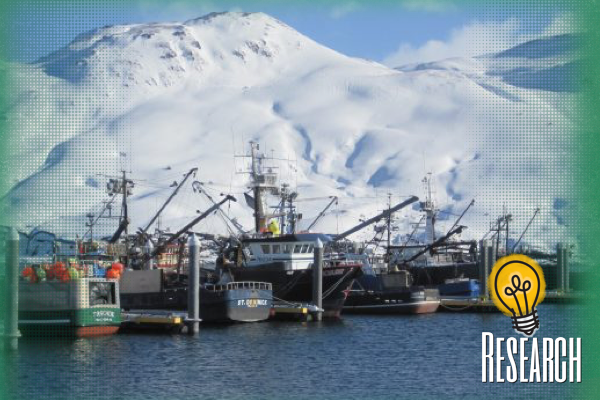UAA international student Douglas Baye: 'I absolutely love going to school'
by Tracy Kalytiak |

Not so long ago, Douglas Baye was working in information technology positions for Chevron Nigeria Limited that gave him a life pretty similar to those of Alaska's Slope workers — two weeks at home, two weeks at work.
He loved his job and he loved school: Douglas had a bachelor's degree in computer science and was nearing the end of studies for a postgraduate diploma he needed for his master's degree.
Then, oil prices crashed.
"Companies started downsizing, work conditions weren't as rosy as they originally were when I started," he said. "'Round about 2013 was when the idea of coming to the U.S. came up. Then, it was just talking about it, thinking about the idea, but it was nothing firm. But as the conditions were changing, then we started really talking about [how] since things were not looking very good anymore, I might as well consider that option of going to the U.S.
The difference between night and day
Nigeria, a former British colony, was Douglas' home all his life. He lived in two places there: in Ikeja, capital of the state of Lagos (pronounced LAY-goes), when he was a baby, and then Surulere, one of 20 "local government areas" tucked into greater metropolitan Lagos.
Lagos is the most densely populated metropolitan area in Africa, home to 21 million people. (Cairo is second, with 15.2 million). The city is situated just 446 miles from the equator, so it's hot. Sweating people swarm and crowd against each other at the markets. Yellow buses, vans and cars fill Lagos' ubiquitous traffic jams-commercial vehicles in Lagos are painted yellow to distinguish them from private vehicles.
"It's easy to get worried and scared when you first get there," Douglas said.
Despite the heat, crowds and noise, Douglas says Lagos' sense of community is strong.
"People are very friendly and accommodating when they know you're not from those parts," he said. "They're very warm and welcoming."
The fracas on the streets of Lagos is overwhelming, during the day. Distractions of every kind make it hard to focus and really see the place.
But at night, the city is transformed.
"Everyone's gone someplace to go rest, the roads are freer and the lights are on," Douglas said. "At night it's more serene, much more quiet. You can look around and notice things you didn't necessarily see with daytime. Some people have an artistic eye: no matter the chaos, they see something beautiful. Some people need to be a little bit more focused to appreciate what's in front of them."
Douglas described one of his favorite quiet-evening views there in Lagos, in the posh Victoria Island area that serves as the city's commercial nerve center.
"There's a beautiful coastal road that has the Atlantic Ocean on the side," he said. "On parts of the ocean, you can see ships lazily in the water. The lights of the boats on the water could pass for Venice. For me, that's much of why there's that difference, night and day, in Lagos."
'An awesome experience'
Computers have mesmerized Douglas since he was a child. He and his friends knew the names of Bill Gates, Steve Jobs, "and all those young innovators and inventors."
"It was all so fascinating," he said. "I always wanted to be a computer programmer, software developer. But through college I don't think I was able to meet the creativity levels."
He earned a computer science degree from Yaba College of Technology, where he delved into life as a computer science student by joining a national association, writing for the department's editorial board-even joining the computer science department's soccer team. He earned his PGD from Federal University of Technology Akure and stayed involved.
Along the way, he worked eight years as an IT support person, supporting users and fixing the problems they encountered.
"That was an awesome experience," he said. "I found I had this likeness for problem solving. To get to what the problem is and how to solve it, you have to go meet the person and talk to the person and have a conversation. It was just nice. It was like the perfect package. It's not the sort of job that keeps you away, locked up in one room."
People seeking help would present him with a variety of electronic items to examine.
"Some of the devices I've seen, I'm not wealthy enough to own," he said, "but being in that job put me in the position where I was able to hold some of them in my hand."
Getting a higher-quality education
Coming to Anchorage was exciting. Douglas' cousin and brother already lived here, so he had a place to live and familiar people to live with. It also helped that he knew the language, since English is the official language of Nigeria.
"If you want to be very formal with somebody, you speak English," he said of his life back home. "If you want to take it to a personal, informal level, then you could speak what we call pidgin English, which is just English broken down with slangs and mixed up with other things." He laughed: "If I wanted to speak to another Nigerian here, you'd probably be staring at us like we fell out of the sky."
Best of all, Douglas would return to school.
"I'd go to school all my life if it were possible," he said. "That was my real push, the most incentive in it for me: I'm going to the U.S. and have the opportunity to go to school, which was wonderful."
Not many Nigerians or Africans have that privilege, he said, "to go outside the country and get what we really consider to be higher-quality education, better exposure to the experience. It's invaluable."
More than a little fear was involved. Douglas' mother has worked as an accountant and data-entry operator, run a daycare center and, now, owns a business selling food and drinks. His father was a businessman, a traveling contractor supplying mechanical and engineering parts in Nigeria and neighboring Cameroon.
"I was worried, because it's also a kind of investment," he said. "It's like putting our money on stocks. We're not particularly a very wealthy family, so it takes a lot of collective effort. If it doesn't work out..." his voice trailed off. Then he continued: "And it's very expensive for an international student anywhere in the world, not just here in the U.S."
Settling into Anchorage life
Here at UAA, Douglas is working toward his project management degree and has a job as a student assistant for International Student Services in which he provides clerical support for Admissions and the ISS advisor's office.
He's also serving as president and soccer team captain of the United Global Student Organization, working as an advocate for international students and has been consulted by Commuter Services' Global Kitchen Committee, which promotes cultural awareness and appreciation in the UAA community through food. Douglas has volunteered with New Student Orientation as well, through its FUSION (For Unity and Service In Our Neighborhoods) program, volunteered at the (now-decommissioned) Educational Opportunity Center's college fair and hosts International Show on KRUA 88.1-FM on Thursdays from 2-4 p.m.
Douglas has also reached out in the Anchorage community, volunteering to be a judge for Chugiak High School's "We as Global Citizens" project last year and as a sound and video technician for Jewel Lake Parish church.
His work has brought him recognition: Douglas' leadership and above-and-beyond contributions to UAA and the community earned him a Chancellor's Martin Luther King Jr. Student Appreciation Award last month.
Written by Tracy Kalytiak, University of Alaska Anchorage
 "UAA international student Douglas Baye: 'I absolutely love going to school'" is licensed under a Creative Commons Attribution-NonCommercial 4.0 International License.
"UAA international student Douglas Baye: 'I absolutely love going to school'" is licensed under a Creative Commons Attribution-NonCommercial 4.0 International License.














